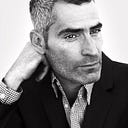Member-only story
The Long Education of Daniel Radcliffe
The young actor puts his decade-long stint as the world’s most famous schoolboy behind him with a career-defining turn as Allen Ginsberg.
Photography by Kai Z Feng / Styling by Grant Woolhead
Let’s be clear: It is perfectly possible to write about Daniel Radcliffe without resorting to Quidditch jokes or salty references to magic wands. It just doesn’t happen very often. We have, after all, watched him — or a version of him — grow up before our eyes at the very time when many of us needed cinema’s charms and potions most. It began with Harry Potter and the Sorcerer’s Stone in November 2001, when smoke still wafted over Ground Zero, with a hesitant, touchingly overwhelmed 10-year-old arriving at Hogwarts only to find himself in a fight with an invisible but omnipresent evil. It climaxed 10 years later, in July 2011, with a self-aware, determined young man finally vanquishing Ralph Fiennes’s Lord Voldemort, coincidentally a few months after Navy SEALS dispatched Osama bin Laden. Life is sometimes eerie that way.
But Daniel Radcliffe is not Harry Potter — he just looks and sounds a lot like him. It can be a burden, and not just because of the security detail that accompanies him everywhere. When you’ve played one role for half your life, it casts a long shadow. Since his conquest over evil, Radcliffe has taken the lead in a…
